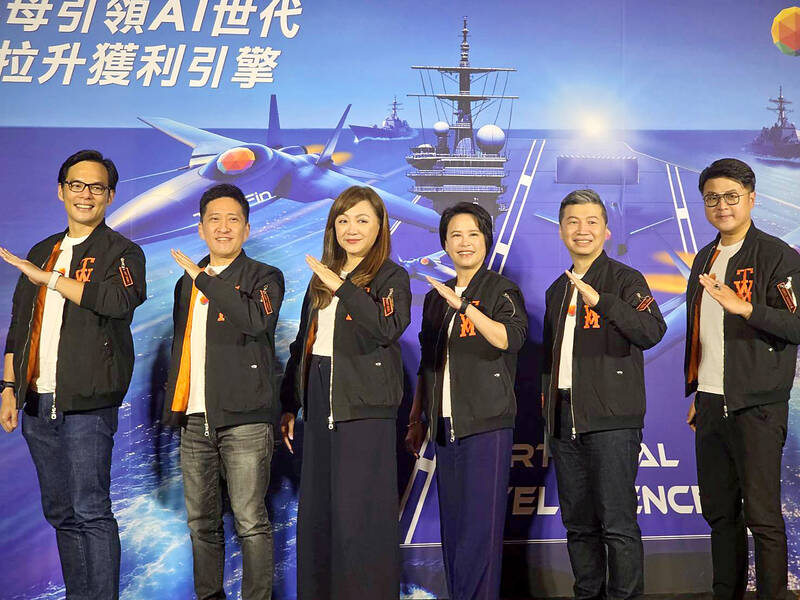Taiwan Mobile Co (台灣大哥大) yesterday said that it aims to achieve double-digit profit growth this year, driven by the rapidly increasing demand for its new technology-oriented services, including artificial intelligence (AI) and cloud-based solutions.
Taiwan Mobile president Jamie Lin (林之晨) told a media briefing in Taipei that double-digit profit growth is also the company’s long-term goal.
The company’s strategy is to expand beyond its core telecom business to provide technology-driven services in three major segments: AI, cybersecurity and cloud-based services, he said.

Photo: CNA
Technology-oriented services accounted for more than half of the company’s consolidated revenue last year, and this contribution is expected to grow further, Lin said.
Enterprise services are projected to account for a double-digit percentage share of the company’s total revenue, he said.
This year, Taiwan Mobile aims to increase its enterprise revenue by 20 percent, fueled by strong demand for cloud-based AI services and cybersecurity solutions, he added.
As a result, the company expects enterprise services to grow faster than its overall telecom services revenue, which is forecast to increase by 5 to 7 percent annually, he said.
“We aim to grow our enterprise service revenue by 20 percent this year. Within this segment, cloud-based and AI services are expected to grow 223 percent annually, followed by a 94 percent growth in cybersecurity solutions,” Taiwan Mobile chief enterprise business officer Shing Chu (朱曉幸) said.
Last year, Taiwan Mobile’s revenue grew 9 percent year-on-year to NT$199.37 billion (US$6.75 billion), while net profit increased 13 percent to NT$13.82 billion. Earnings per share rose to NT$4.57, the highest in six years.
Telecom services accounted for 43 percent of the company’s total revenue last year, while its online and TV retailing subsidiary, Momo.com Inc (富邦媒體), was the largest revenue contributor, accounting for 56 percent.

NOT JUSTIFIED: The bank’s governor said there would only be a rate cut if inflation falls below 1.5% and economic conditions deteriorate, which have not been detected The central bank yesterday kept its key interest rates unchanged for a fifth consecutive quarter, aligning with market expectations, while slightly lowering its inflation outlook amid signs of cooling price pressures. The move came after the US Federal Reserve held rates steady overnight, despite pressure from US President Donald Trump to cut borrowing costs. Central bank board members unanimously voted to maintain the discount rate at 2 percent, the secured loan rate at 2.375 percent and the overnight lending rate at 4.25 percent. “We consider the policy decision appropriate, although it suggests tightening leaning after factoring in slackening inflation and stable GDP growth,”

DIVIDED VIEWS: Although the Fed agreed on holding rates steady, some officials see no rate cuts for this year, while 10 policymakers foresee two or more cuts There are a lot of unknowns about the outlook for the economy and interest rates, but US Federal Reserve Chair Jerome Powell signaled at least one thing seems certain: Higher prices are coming. Fed policymakers voted unanimously to hold interest rates steady at a range of 4.25 percent to 4.50 percent for a fourth straight meeting on Wednesday, as they await clarity on whether tariffs would leave a one-time or more lasting mark on inflation. Powell said it is still unclear how much of the bill would fall on the shoulders of consumers, but he expects to learn more about tariffs

Greek tourism student Katerina quit within a month of starting work at a five-star hotel in Halkidiki, one of the country’s top destinations, because she said conditions were so dire. Beyond the bad pay, the 22-year-old said that her working and living conditions were “miserable and unacceptable.” Millions holiday in Greece every year, but its vital tourism industry is finding it harder and harder to recruit Greeks to look after them. “I was asked to work in any department of the hotel where there was a need, from service to cleaning,” said Katerina, a tourism and marketing student, who would

i Gasoline and diesel prices at fuel stations are this week to rise NT$0.1 per liter, as tensions in the Middle East pushed crude oil prices higher last week, CPC Corp, Taiwan (台灣中油) and Formosa Petrochemical Corp (台塑石化) said yesterday. International crude oil prices last week rose for the third consecutive week due to an escalating conflict between Israel and Iran, as the market is concerned that the situation in the Middle East might affect crude oil supply, CPC and Formosa said in separate statements. Front-month Brent crude oil futures — the international oil benchmark — rose 3.75 percent to settle at US$77.01